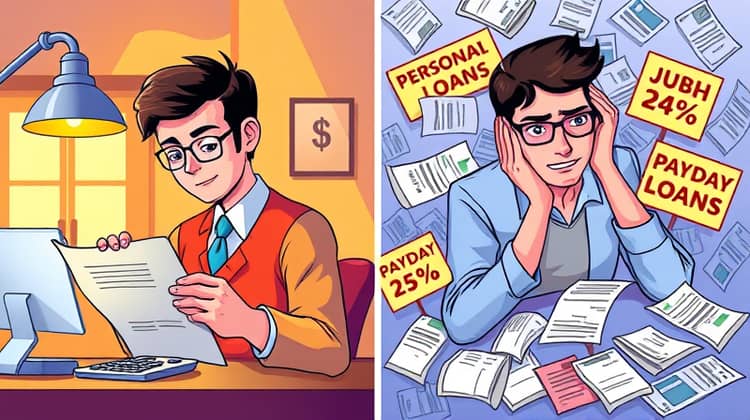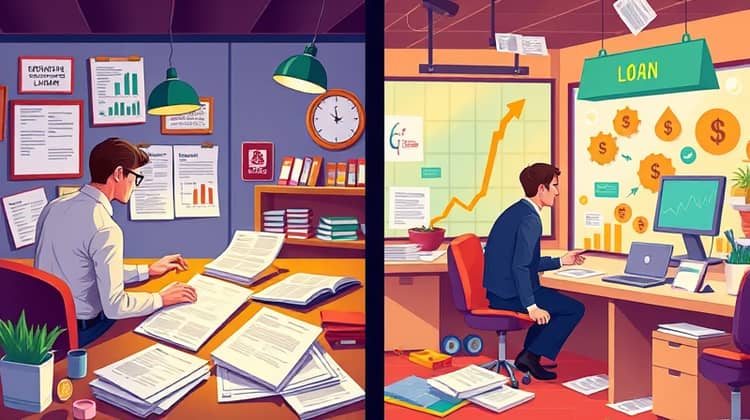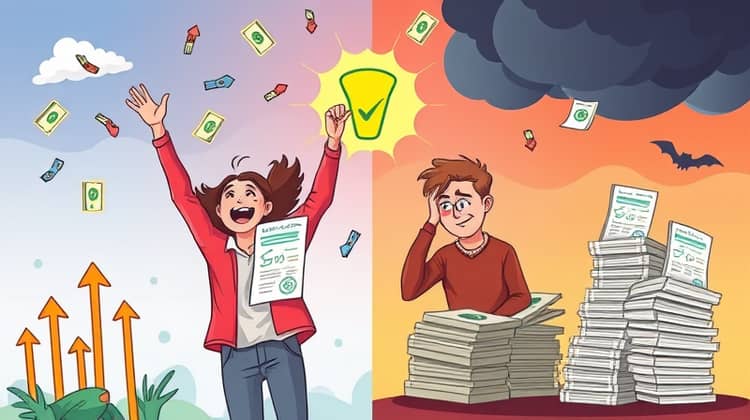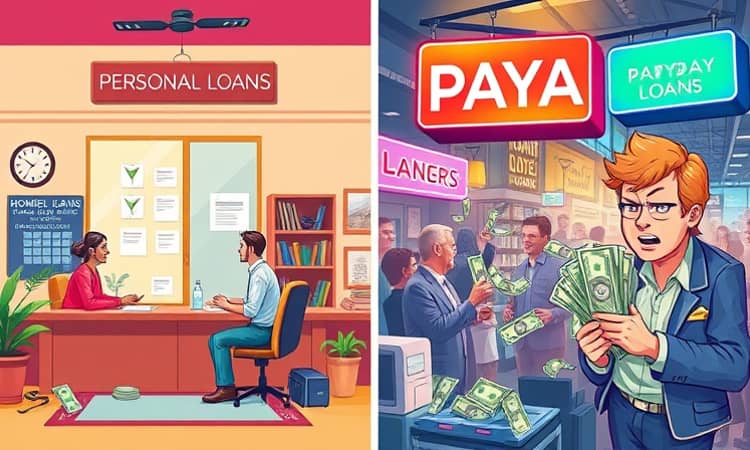When it comes to borrowing money, individuals often face a choice between personal loans and payday loans. Both options serve different purposes and come with their own sets of advantages and disadvantages. Understanding these differences is crucial for making an informed decision that aligns with one's financial needs.
Personal loans are typically offered by banks and credit unions, meant for larger expenditures like home repairs or debt consolidation, while payday loans are short-term, high-cost loans meant to cover immediate financial emergencies until the borrower's next paycheck.
This article will explore five key differences between personal loans and payday loans, including loan amounts, interest rates, repayment terms, the approval process, and their impact on credit scores. Each aspect will shed light on which option might be more suitable for you.
1. Loan Amount

Personal loans and payday loans differ significantly in the amounts they provide. Personal loans typically range from a few thousand to tens of thousands of dollars, making them suitable for larger expenses. Conversely, payday loans are generally much smaller, usually between $100 to $1,500, designed to provide immediate cash flow rather than long-term financial solutions.
The greater loan amount of personal loans allows borrowers to address substantial expenses, such as home repairs, medical bills, or other financial burdens. On the other hand, payday loans are structured to serve as a bridge until the next paycheck, often leaving borrowers with a need to take out additional loans to meet lingering financial issues.
Borrowers should carefully consider their financial needs before choosing a loan type, as the loan amount can directly influence the overall cost and effectiveness of the borrowing experience.
- Personal loans can range from $1,000 to $100,000+
- Payday loans typically offer amounts from $100 to $1,500
- The larger amounts of personal loans support significant financial needs
As such, borrowers must assess their specific situations and determine which type of loan would satisfy their needs effectively. A sizable, carefully structured personal loan could provide a more comprehensive solution while being mindful of repayment responsibilities.
In contrast, payday loans, with their smaller amounts, might offer a quick fix but could lead to further financial struggles if not managed properly.
2. Interest Rates and Fees

Interest rates and fees represent another significant difference between personal loans and payday loans. Personal loans often come with lower interest rates because they are secured by the borrower’s creditworthiness or collateral. Generally, these rates range from about 6% to 36% based on the individual's credit score and other factors.
In comparison, payday loans feature exorbitantly higher interest rates that can average anywhere from 300% to 600% APR. These loans are high risk to lenders, which justifies the steep fees and rates. Borrowers may find themselves trapped in a cycle of debt due to the cost of these loans.
Understanding the cost of borrowing is essential when choosing between the two loan types. Consumers must clearly fully comprehend the long-term implications of the rates and fees involved.
- Personal loan interest rates range from 6% to 36%
- Payday loans often have interest rates of 300% to 600% APR
- Long-term costs are significantly higher with payday loans
This understanding is compounded by the hidden fees many lenders impose, which can balloon the total cost of a payday loan significantly. In contrast, personal loans generally have more transparent fee structures that make it easier for borrowers to anticipate their repayment obligations.
Choosing a loan type based solely on the short-term need for cash without considering these costs may result in grave long-term financial consequences.
3. Repayment Terms

Repayment terms vary significantly between personal loans and payday loans. Personal loans typically offer longer repayment periods, ranging from 1 to 7 years. This flexibility makes it manageable for borrowers to repay their debts without putting undue financial stress on themselves.
Payday loans usually require repayment within two to four weeks, coinciding with the borrower's next paycheck. This short timeframe creates pressure to repay quickly, and if the borrower cannot, they may have to roll over the loan, incurring even more fees.
The difference in repayment terms can directly influence a borrower’s decision, as extended terms often lead to lower monthly obligations, making personal loans feel less burdensome.
- Personal loans offer repayment periods of 1 to 7 years
- Payday loans are usually due in a few weeks
- Longer repayment terms reduce financial stress
When assessing loan options, individuals should consider their capacity for repayment. With personal loans, borrowers can plan their finances around more extended repayment cycles, potentially leading to greater financial health over time.
In contrast, the immediate deadlines attached to payday loans can lead to a cycle of debt if the borrower is unable to repay the loan promptly.
4. Approval Process

The approval process for personal loans is generally more rigorous compared to payday loans. Lenders assess borrowers’ credit scores, income, and overall financial health before granting a loan. This scrutiny often requires documentation of income and expenses, making the process longer and sometimes complicated.
In contrast, payday loans tend to have much simpler approval processes. They often require minimal documentation – typically just proof of income and identification. The quick approval times can be appealing to those facing urgent financial needs.
However, this ease comes at a cost, as payday loans are often pursued by those in more dire financial situations, leading to higher chances of financial mismanagement.
- Personal loans require a thorough credit check
- Payday loans often use minimal documentation
- Approval is usually quicker with payday loans
Although payday loans may seem convenient, the downside lies in the potential for aggravated financial issues over time due to their high costs. The ease of access can lead borrowers to rely on payday loans repeatedly, trapping them in cycles of debt.
On the other hand, the thorough process of securing a personal loan strengthens the responsibility of borrowing, encouraging borrowers to reconsider their needs and ability to repay.
5. Impact on Credit Score

Finally, the impact on credit scores is a critical consideration when distinguishing between personal loans and payday loans. Personal loans, when handled responsibly, can help improve an individual's credit score. Timely repayments reflect positively on credit reports, demonstrating financial responsibility and reliability.
Conversely, payday loans can adversely affect credit scores. Many payday lenders do not report to credit bureaus, meaning those who fail to pay may not see immediate repercussions but could end up facing debt collections that will tarnish their scores.
Borrowers should keep in mind that how they manage these loans will affect their long-term financial health and creditworthiness.
- Personal loans can improve credit scores with timely payments
- Payday loans are often not reported to credit bureaus
- Failure to repay payday loans can lead to collections and credit damage
Understanding the long-term implications of each loan type is crucial, as protecting one's credit score can open doors to favorable financial opportunities in the future. Those considering payday loans must weigh this risk seriously against their immediate needs.
Overall, making the right choice not only impacts the borrower's current financial health but also their future viability and credit opportunities.
Making the Right Choice

In light of these differences, choosing between personal loans and payday loans should be grounded in careful consideration of one's financial situation and goals. Effective financial planning involves determining immediate cash needs while also considering obligations and interim solutions that can help mitigate adverse outcomes.
Deliberating the overall cost of the loans, including interest rates and fees, is vital to ensuring that the chosen borrowing method aligns with personal budget constraints. While payday loans may present a quick solution, they can lead to longer-term financial strains
Considering repayment terms, ease of approval, and potential impacts on credit scores will also guide an individual in making the decision that best fits their financial reality.














